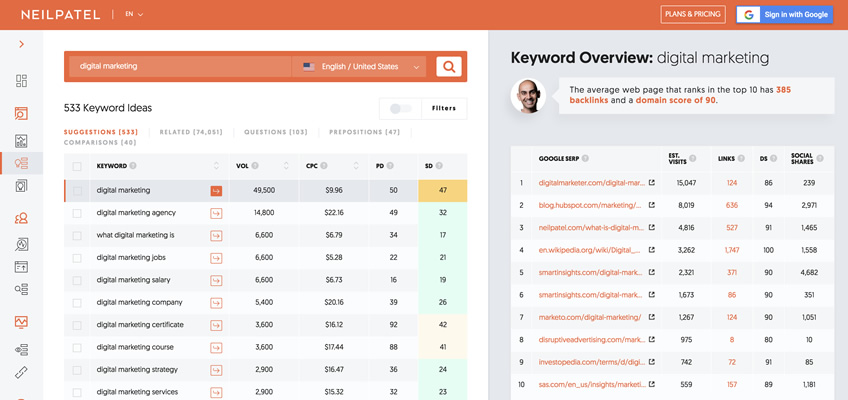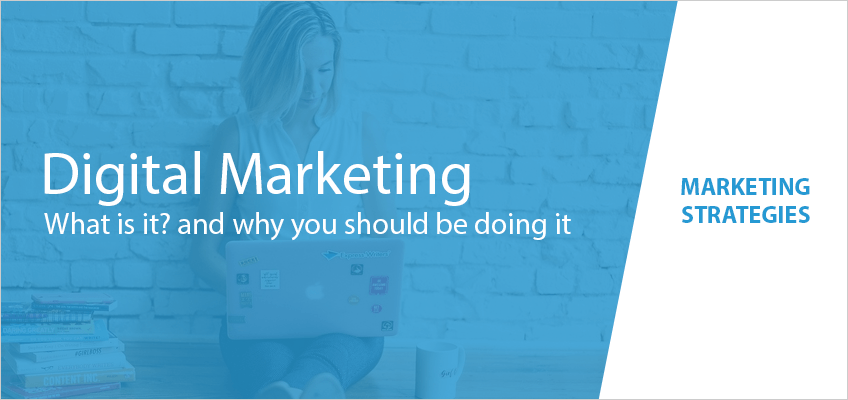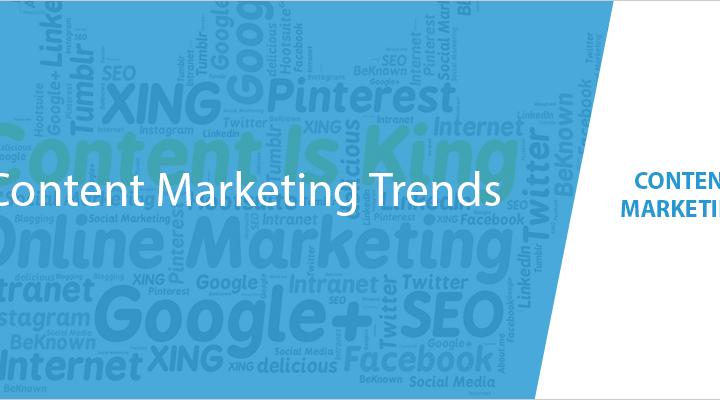When marketing your business you should be looking to get your brand in front of as many potential customers as possible. With over 4 billion active internet users worldwide and over 1.8 billion online shoppers, the chances are you will need a digital marketing strategy.
But what is Digital Marketing?
Digital Marketing, just like traditional marketing, is all about promoting and selling your products using a range of tactics. The difference is, you carry out digital marketing tactics online using techniques such as SEO (Search Engine Optimization), Email Marketing and Social Media Marketing.
Traditional marketing methods such as printed ads or radio ads may still be relevant to your audience. But even taking this into consideration, it’s still highly likely your customers can be found online in some form. Ignoring these areas can hurt your business and give your competitors a big advantage. In short, you really need to build a Digital Marketing strategy before you are left behind.
Let’s take a look at how different types of Digital Marketing work.
Digital Marketing types
SEO
Having a website that sells your products and promotes your brand is a great start to your digital marketing strategy. But you still have to optimize your content if you want people to find you via search engines such as Google.
Search Engine Optimization (SEO) is the process of making your website content easy to find.
Here are some of the most common terms and techniques used in SEO:
Keywords
Before you begin writing content for your website you should do some keyword research. Ranking for keywords that are related to your business will result in website traffic from search engines.
A keyword isn’t necessarily one word. In fact most of the time it will be more than one word. Think of it as more of a key-phrase than a keyword. If you are at the beginning of your website’s SEO journey then it is advisable to use long-tail keywords. These tend to be three or four words long. More if necessary. Long-tail keywords will give you a better chance of ranking high in search results. They can also help you gain visitors looking for something very specific that you can help them with.
Keyword research can be carried out using online tools like SEMRush, Ubersuggest and the Google Keyword Search tool. Most keyword search tools have paid plans but you can find enough vital data using the free plans.
These tools all work in a similar way. First, you enter a keyword relevant to your business. You can now see data on how many people search for that keyword over a specified time period. Also, you can see other related keywords that could be better than the one you entered. You can begin to build your website content around the best keywords you find.
You can also find data on keywords that your competitors are ranking for using a keyword search tool. Simply enter the web address of a competitor and you will be given data on searches they are ranking for and the content they are using to rank well. This information is vital as you will want to get your business above your competitors in search results.

On-Page SEO
With your keywords researched and ready to use, it is important to know where in your content they should be used. The use of your keywords should be used naturally within your content and shouldn’t be over used. Keyword stuffing could result in your website being penalised and dropped down the rankings.
Some tips for optimizing your content for search engines:
- Target keyword – try and use your keyword in the first paragraph of your content. Use it again throughout your page content but only where relevant and necessary. Don’t overuse it.
- Page URL (web address) – Keep your URL short, easy to read and have your keyword in it.
- Page Title – Use your keyword in your title tag. Then add modifiers such as “new”, “best” or “top”. This will help you rank for long-tail keywords. Numbers can also help if they are relevant. So lets say your keyword is “WordPress Themes”. Your page title could be “20 best WordPress themes 2020”.
- Meta Description – When someone finds you in a search result they will see your link and a short description of the page. Write a good page description that is straight to the point and stands out from the other search results. Your keyword should be in it as Google will bold that term to match the search.
- Headings – Use relevant headers throughout your content to break up long sections and to give your page a structure. Most content management systems such as WordPress will automatically add an H1 tag to your page title. Add H2 and H3 headings to your page as well.
- Image Attributes – All images should have alt tags (alternative text) and a descriptive filename. For at least one image use your keyword in the alt tag. Also make sure the filename uses the same keyword.
- Links – Use external and internal links where possible. This helps google understand your page content and relevance to your keywords.
- Content Length – If you are writing a blog post then it is recommended to have at least 500 words. Search results seem to indicate that posts over 2000 words are favoured over smaller articles.
- Page Speed – Google has gone on record to say that page speed has an impact on search rankings. Good hosting, image size reduction and removing third party scripts are just a few things that can speed up your site. Run your website through an online tool like GTmetrix or PageSpeed Insights to find out where you can improve your website speed. These tools also offer mobile specific speed results.
If you are using WordPress, a great tool that helps you optimize your content is Yoast SEO Tool (link). Yoast scores you against many of the factors above to make sure you are optimizing your content correctly. The plugin also offers advice on how to improve your SEO score and the content readability.
Off-Page SEO
Another way to generate traffic is by improving your Off-Page SEO. This involves using SEO techniques other than your own website. The main activities involved with Off-Page SEO are link building, brand mentions and social media marketing. All of these factors can help Google understand how popular your website is and thus improve your rankings.
Link building is the process of getting other websites linking back to your content. It’s important to note that quality is far more important than quantity when it comes to backlinks. Having high authority websites linking back to your website will boost your rankings significantly. Often these can be achieved just by having great content that other websites want to to link to.
Some other ways to get backlinks are:
- Write guest articles on other websites
- Contact and build up relationships with other website owners
- Write comments on other blogs and forums
- Publish a guide or ebook
- Broken link building. Find broken links on websites and offer new ones linking back to your website
Social Media Marketing is the process of gaining traffic and brand awareness through social media sites. Providing helpful and interesting content through channels such as Twitter, Facebook, Instagram, Pinterest, Snapchat, Linkedin and Youtube will lead traffic back to your website. Many different social media channels are available and it’s important to explore which ones are most relevant to your business and audience.
Ways you could use Social Media for marketing include:
- Share quality content on your social media pages
- Engage with visitors – answer questions and offer help
- Analyze visitor engagement – social media channels provide analytical data on visitors
- Run adverts – social media channels allow you to run targeted ad campaigns
- Monitor social media mentions of your business
Search Engine Marketing (SEM)
Ranking high in search engines is big business. The techniques we have looked at so far are all pretty much free to do and will generate good organic traffic. Big companies, however, pay for the privilege of sitting at the top of Google for searches related to their business. We call this Search Engine Marketing.
When you do a search on Google you will notice that more often than not the top results are adverts. The businesses who appear here have paid for the keyword you searched for. Some keywords are worth a lot of money as businesses compete for highly searched terms.

These adverts are known as PPC (Pay Per Click) ads which means the buyer pays for each click. With high ranking keywords, you can imagine this becomes a very expensive online marketing strategy, but one that has proven to work. Keyword research is key to success with PPC and Google offers it’s own free Keyword search tool to help.
A more recent form of Digital Marketing advertising is through social media channels. Facebook and Twitter are particularly popular platforms where businesses can boost posts or place adverts that appear on targeted users feeds. These promotions can be pushed to specific users based on various demographics. Businesses pay for these ads per click but can have a set budget with a maximum spend before the campaign begins.
Local SEO
Local SEO involves optimizing your website for local searches. The main principles of SEO are exactly the same. Keywords are still key to your success but this time you will want to focus on what people are searching for locally. You can still use well searched terms for your niche but also include the name of the city your business is in and/or the area your business serves.
Other Local SEO strategies you should look into are:
- Online directories – add your business to local directories such as Yell.com
- Google My Business – the biggest directory of all. Sign up for an account to gain a free listing on Google. When someone searches for your business type in your area, your business website link will appear along with all your other important information.
- Online reviews – encourage your happy customers to write a review on websites like TrustPilot (link). This can build you a strong local reputation.
Content Marketing
Content Marketing is a strategy based on providing free content to your target audience. This can come in the form of blogs, social media posts, ebooks and videos. Through these channels you can provide helpful content, guides and advice, all related to your business.
The end goal is to lead potential customers back to your website or wherever you sell your products. Providing good content earns trust within your industry. Furthermore, you can be seen as a leading influencer within your niche if you provide good consistent content.
Leading brands in all industries have adopted content marketing as a key strategy. From Microsoft to Walmart, companies big and small all offer content including blogs, video and social media.
The key to success with content marketing is valuable content. You will want to build a loyal base of followers who trust your brand and your message. This can only be achieved if you are helping them solve a problem or making their lives easier in some way. So think carefully about your content. The better you know your customers the better content you can provide them.
Some tips for producing good content:
- Show emotion where possible. Tell stories that get your audience to feel emotion. This will gain their trust.
- Writing content on a regular basis is important but the quality of your content is more important. Don’t write for the sake of it. Write content that is valuable to the reader.
- Use video and images where possible. People prefer this to reading lots of words. Over 2 billion people log into Youtube every month. People love watching videos.
Affiliate marketing
Affiliate marketing is where a business allows others to earn a commission by recommending their products or services. This would normally be a percentage of every sale. So for example, a blog owner who writes about SEO could promote a SEO tool on their website. This could be an advert, a review or just a link in their content that goes to the SEO tool website.
All links back to the product website are tagged. If the visitor goes on to buy a product then the product owner knows where the buyer came from. They then give the blogger a percentage of the price paid. This is a win win for both the product maker and the blogger. The product maker can build an army of affiliates who are promoting their business. The blogger is also earning income by just adding links or adverts on their website.
Email Marketing
Using email to connect with existing or potential customers can be a rewarding marketing strategy. Building up a mailing list is the first part of the process. This can be done by offering incentives on your website where a visitor is asked to enter their email address to subscribe in return for something. This would normally be something free such as a useful guide. Just like any content marketing task, it’s important to offer high quality content that will benefit the consumer and earn their trust.
Once you have built up a mailing list and hopefully visitor trust, you can begin to send emails offering your services or products. Tools are available such as Mailchimp that help you optimize your emails and track user engagement. Also remember, you should always offer the recipetent a link to opt out of future emails.
Digital Marketing Tools
Lots of tools are available to help you with your Digital Marketing strategy. Most are free and straightforward to use. Here are some of the most popular:
Analytics and Keyword Research
- Google Analytics – Allows you to view data on how your website visitors interact with your website. This includes how they got to your site, what they looked at on your site, where they come from, the technology they used and much much more.
- Google Search Console – Provides details of how you are performing on Google searches. This includes the exact terms visitors are searching for to get to your site.
- Google Adwords – This tool’s primary purpose is to allow you to add your advert to the top of Google searches. It also includes a free keyword tool that shows data for searches with geographic and time scale filters.
- Google Pagespeed Insights – Run your website through this tool to get a score based on the sites technical performance. This will show you suggestions on how to optimize your site to improve its speed. Mobile optimizations are also covered.
- Yoast – A very helpful WordPress plugin that helps you improve your on page SEO and readability.
- UberSuggest – A keyword research tool will help you find some great keywords and give you lots of data about your competitors.
- SEMRush – Another keyword tool that goes into much more depth than UberSuggest although multiple searches will cost you.
Content Promotion
- Canva – A free tool that can be used to create promotional material for websites, blogs and social media. This is a great alternative for those who don’t have the time, skills or budget for Photoshop.
- MailChimp – This tool allows you to create email campaigns for your business. It includes templates to give you a quick start and it offers stats at the other end.
- HootSuite – A social media management tool integrates with the major platforms. This is great for tracking visitors from various channels in one place.
Should you be doing digital marketing?
Just like any marketing strategy, your digital marketing plan should be looking at the 4 Ps – Price, Product, Promotion and Place. It’s about finding the right price for your product and promoting it in the right place.
Billions of people every day use social media, search online, shop online and read blogs. Therefore, a solid Digital Marketing plan puts your brand in front of these potential customers. Combine this with some of the excellent digital marketing tools available and and will be well on your way to success.
Not all digital marketing types and tools will suit your business. You have to find the ones that work for you. But one thing is for sure in today’s world. If you want a successful business, a digital marketing strategy is a must.





[…] resources are available to you and often free. Use these resources to build up and execute your marketing plan. In the long run the benefits will be there for you to […]
[…] as a large segment of the population is either engaged with or, at least aware of, the internet. Digital marketing is a catalyst and a response to this shift towards our evolving […]
[…] best way to do that is by taking advantage of some of the amazing tools available. These essential digital marketing tools are mostly free or inexpensive. The only real cost is your time and effort spent getting the […]